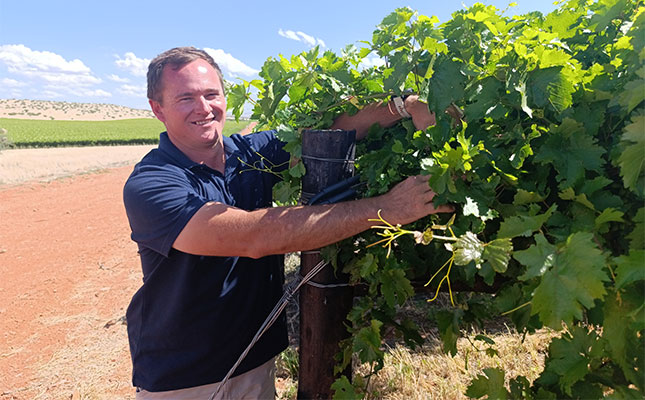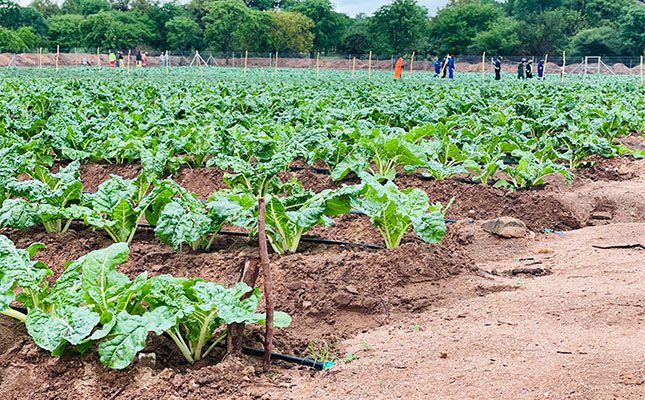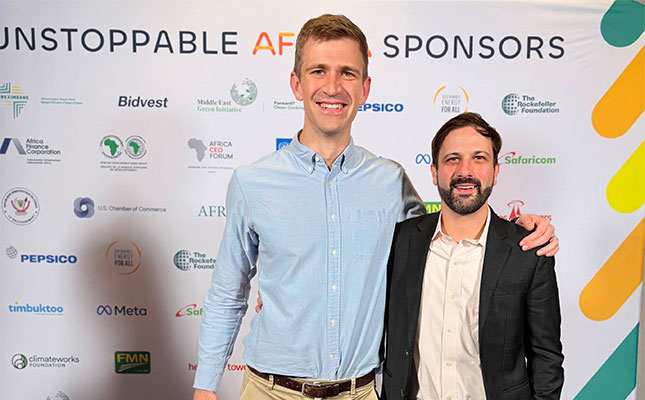John Chelius grew up in Johannesburg, as far away from a rural upbringing as one can imagine. After completing an honours degree in Agriculture at Pietermaritzburg University, he spent eight years working for Denny Mushrooms in Assegai, outside Durban. By 2004, it was time for change. “I wanted to by my own business and the opportunity to buy a hydroponics farm in Assegai came up,” John recalls. “The major retailers said they’d support me, which gave me the confidence to go ahead with the deal. Retailers need good suppliers and there aren’t a lot of guys who specialise in fancy lettuce varieties and pillow packs.” Waterfield Farm is now one of the largest hydroponics farms in KZN – if not the largest.
Some of John’s field labourers have been with him for 12 years and other staff have been with him since he took over the business. “It’s been a steep learning curve and has taken a massive team effort to get where we are,” says John. “Peter Cramer, the farm manager, has been crucial to the success of the hydroponics division. E veryone has contributed to our achievements, from Marie Grobler in accounts to our technical manager Morné Hutton and operations manager Wayne Erasmus, who really runs the show in the packhouse and in dealing with customers.”
One of the major lines of this 9ha farm with its 36km of gravel beds, is salad pillow packs. ome 70% of the gravel beds are under lettuce: green and red frilly lettuce, green and red butter lettuce, green and red cos, and Batavia. Some 10% of the beds are under baby leaf varieties such as cos and green and red oak, Asian vegetables like Mizuna and pak choi, and herbs for the herb salad pillows. Celery, spring onions and herbs make up the balance of 20% of the beds. “These crops grow well in our system,” says John. “We have the right climate and can produce them consistently throughout the year.” There’s a ready market for these products and to keep up with demand, Waterfield is leasing another 5ha of land nearby to grow lettuce, spinach, cauliflower and broccoli. The first crop will be harvested in September.
Climbing the supply chain
The year he purchased the farm, John soon realised he needed a second income stream.He started a prepared fresh vegetable line, including products like diced butternut and pumpkin, soup mixes, stir-fry vegetables, roasting vegetables and potjie mix. To fill orders each week, the company buys in 7t butternut, 2t pumpkin, 1t potatoes, 1t carrots, and a few hundred kilograms of baby marrow, green beans and onions. “The prepared vegetable side was a natural extension of the business,” explains John.
“With the exception of celery, every product that goes through our doors has been processed, which means we already had the right facility for the vegetable lines.” O f the farm’s total income, prepared vegetables now pull in about 40%, lettuce another 40% and celery and spring onions the balance. Waterfield Farm has twice won the Pick ‘n Pay Supplier of the Year award for KZN, in 2005 and in 2006. The key to earning retailers’ appreciation is consistency, says John. “Retailers don’t want to know about problems with stock shortages. You must fill all your orders every day, seven days a week, throughout the year. It takes a lot of careful planning to ensure we always have the range our customers are calling for, be it in our own beds or through our suppliers.” A shortage in one product, such a baby marrows, can affect 15 different products. Being out of production on one variety of lettuce can affect 20 different end products.
International standards frican Beginning is HACCP and EurepGAP compliant and John is in the process of converting to GlobalGAP. “We’ve been EurepGAP certified for three years and spent hundreds of thousands on the packshed and the farm to become compliant. It’s been difficult as the standards keep changing and we’re always having to buy something new or change something. GlobalGAP is really an export standard but a lot of retailers are now using it as a benchmark.” John stresses that because he controls the entire production process from seeds through to harvest on site, converting to GlobalGAP is not a huge issue. “GAP is difficult but achievable,” he shrugs. “You just have to keep up with the paperwork. We keep track of everything. The person responsible for each stage of production keeps records manually.”
The challenge of hydroponics The farm has its own nursery on site, producing 200 000 seedlings a week. “All the seeds we purchase are hybrids. It does cost more but offers a consistent, high-quality crop,” says John.
After four weeks in the seed tray, seedlings are planted out into the hydroponic beds. “Most crops have a five-week turnover although baby leaves take three weeks,” he explains. “They’re an expensive product. The turnaround time is quicker but the yield per plant is 30% lower.” Hydroponics, indeed farming in general, is not for the fainthearted. “Hydroponics is like dairy farming,” stresses John. It’s a seven-day-a-week operation and someone always has to be on duty to make sure the plants are getting what they need.” It also requires deep pockets. “Establishment costs are exorbitant. Farmers thinking of converting a green field site to a hydroponics bed need to start with a big bank balance – and shouldn’t expect it to recover quickly. “I’d say establish a market before planting anything.
The vegetable industry has too many guys who plant in the hope that they’ll find a market and they wreak havoc with prices.” However, John sees the biggest threat to his business as the big suppliers from Johannesburg who truck their produce into the region. “But I believe the high diesel price will make it difficult for them to compete,” he adds. The ongoing success of Waterfield is John’s greatest achievement. “We are expanding at a hell of a rate. That’s a sign we are doing something right. When I started here, I thought I could do everything. I soon learned that was a recipe for disaster. To succeed, we need to focus on what we do well.” Contact Waterfield on (031) 768 1161, fax (031) 768 1107, or e-mail [email protected]. |fw
Get trusted farming news from Farmers Weekly in Google Top Stories.
➕ Add Farmers Weekly to Google ✔ Takes 10 seconds · ✔ Remove anytime




